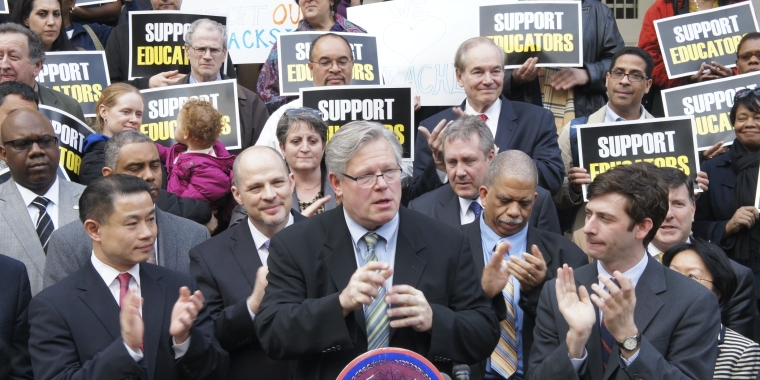
Gay City News: Rent Cap Awaits Guv’s Call
Four-year effort to curb costs for AIDS housing tenants now down to one man
Published: Thursday, May 13, 2010 1:46 PM CDT
BY PAUL SCHINDLER
Since the waning days of the Pataki administration, advocates have
been pressing for legislation to cap rents paid by thousands of
clients of the city’s HIV/ AIDS Services Administration (HASA) at 30
percent of their income. Now that approval for the measure has finally
been secured in both the Assembly and the Senate, Governor David A.
Paterson’s willingness to sign the measure has suddenly become a major
question mark.
The budget woes facing the state and the city have thrown a
particularly bright light on the fiscal implications of any new
legislation, but aggressive lobbying by the Bloomberg administration
pressing the governor to veto the measure — backed up by the New York
Post editorial page — has created particular concern among advocates.
Under current state law, the Office of Temporary and Disability
Assistance mandates that HASA clients receiving public income support
are allowed to keep only $344 above what their rent is pegged at —
which means less than $12 a day to cover all their other expenses.
AIDS groups, including the New York City AIDS Housing Network
(NYCAHN), Housing Works, and Gay Men’s Health Crisis (GMHC), along
with out gay Senator Thomas K. Duane and out lesbian Assemblywoman
Deborah Glick, both Lower Manhattan Democrats, have been fighting to
overturn this income restriction since 2006.
According to NYCAHN, the bill, if enacted, would offer relief to more
than11,000 New Yorkers living with AIDS who receive either Veterans
Benefits from the federal Veterans Administration or SSI or SSD from
the US Social Security Administration. When this controversy first
arose, Gay City News confirmed with the US Department of Housing and
Urban Development that renters receiving federal housing assistance —
such as Section 8 vouchers — cannot be charged rents above the 30
percent income threshold.
Advocates have pointed to many instances where HASA clients have paid
as much as 75 percent of their monthly income in rent; they argue that
the resulting homelessness has imposed a greater fiscal burden on the
state than simply changing the law would.
A memorandum from the Bloomberg administration lays out the case
against the legislation based on cost, precedent, and the availability
of other HASA monetary entitlements that mitigate the grim picture
spelled out by advocates. Noting the billions of dollars in deficits
facing the city and state in upcoming years, the memo estimates that
the annual cost of the legislation would be $31 million, half of which
would be borne by the city. The Bloomberg administration argues that
the limited money HASA clients on public assistance are allowed to
keep can be supplemented by a special allowance of $193 per month for
nutrition and transportation needs and about $200 in food stamps. That
safety net, the administration maintains, has kept annual evictions to
fewer than 75.
*
Just as important to the city, it would seem, is what it sees as “an
expensive precedent” in this legislation. “No other population in
receipt of public assistance in private housing has their rent
contribution capped at 30 percent of household income,” the memo
argues. Though the city has income-based housing programs, the
administration maintains this would be the first one “based solely on
medical diagnosis.”
A study by Shubert Botein Policy Associates challenges a wide array of
assumptions made in the city’s fiscal analysis of the legislation. The
most pointed criticisms that study made are that the administration’s
figures “do not purport to estimate savings from the proposed rent
cap”; use a definition of evictions that significantly undercount how
many people actually lose their homes; and fail to adequately
characterize the duration and costs of the resulting stays such HASA
clients face in expensive, city-funded single room occupancy (SRO)
facilities.
Duane — who made a dramatically impassioned speech on the Senate floor
last summer when the legislation was first passed there — takes
particular exception to the city characterizing the proposed rental
cap as something unprecedented and exceptional. A medical diagnosis,
he noted, was precisely the basis on which HASA’s housing program was
first created more than 20 years ago during the Koch administration.
Any HASA client must demonstrate income eligibility in seeking public
rental assistance. And, Duane argues, as with every federal housing
assistance program, all other city and state “enhanced rental
assistance programs” cap rent at 30 percent of income.
In dueling with the mayor, Duane and Glick have the solid support of
the City Council, which by a 49-0 vote last fall endorsed the rent cap
legislation. In a May 6 letter to the governor, Council Speaker
Christine Quinn, an out lesbian Chelsea Democrat, joined by three of
her colleagues, urged Paterson to sign the legislation, noting much
the same points Duane makes regarding how common rent cap guidelines
are in housing assistance programs, how important stable housing is
for those living with HIV, and the fact that the administration’s
analysis fails to take account of the fiscal impact of HASA clients
losing their homes. Acknowledging the fiscal strains faced by the city
and the state, Quinn argued that the current economic troubles make a
“fair and equitable housing policy” that much more important.
The current worry over how the governor might proceed on this
legislation is ironic, given that officials in both his administration
and that of his predecessor, Eliot Spitzer, have long engaged
advocates on solving a problem inherited from the Pataki era.
To read the full article, click here.
